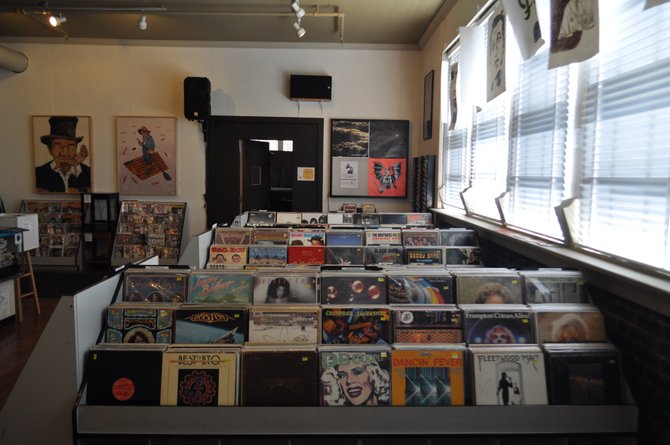I get in an odd headspace sometimes when I listen to music from my meager stack of a record collection. Most of my records came from a kind of nostalgic purchase rather than the individual album's importance in the pantheon of impeccably produced vinyl. For instance, I have "Chutes Too Narrow" from The Shins because it represented infinite possibilities when I was a 12-year-old learning acoustic guitar amidst friends who were pounding out power chords on electrics. Of course, I own some records because I couldn't possibly escape buying them, such as Maritime's "Human Hearts," an all-time favorite CD that warranted tenancy on my top shelf. In fact, several of my records are repeat purchases, as if I'd be ineffectual as a fan without a vinyl version.
Then, the wild cards. Though few and far between, these records make up my prized possessions in a lot of ways. I'm not much of a risk taker by nature. If the tree is tall, and I'm wearing sandals, I probably won't climb it. If the mic isn't grounded, I probably won't touch it. If your pet snake is a snake ... well, that's just a no. But I make a few exceptions, including theme park rides, strange foods and buying music.
Once in a blue moon, I'll simply walk into a music store, ask an employee what his or her favorite new release is and buy that record. It's a strange thing, I know. It's even a bit stupid. After all, people have vastly different tastes in music even within the same genre. I love indie rock, but I generally don't enjoy low-fi music. Now, I don't mind a bit of dirt in the track—some of my favorite albums aren't polished to perfection—but if a new album that cost $10,000 to make sounds as if it was recorded with bargain-basement equipment that's older than I am, then I have qualms.
Blind buying has never steered me wrong. I've found some gems that wouldn't have met my ears otherwise, from The Dear Hunter's "Migrant" to Stars' "Set Yourself on Fire" to Two Gallant's self-titled album. This method can actually be pretty beneficial because it removes us from the equation a bit. Sure, we have a good idea of what we like, but creating a concrete "This is good, and this is bad" stance on music is counterproductive.
As antithetical as it sounds, humans are both creatures of habit and creatures of change. It's easy to sit your musical taste in a box and blare the same CD forever. That is, it would be easy if we weren't regularly going about our lives. As it is, though, people change—change their friends, change their clothes, change their schedules—and a music style that appealed to you when you were 17 and anti-everything doesn't apply when you're 30 and married with two kids. Finding an unfamiliar artist challenges your musical palate and pushes past what you have accepted as "your music" to a point where you don't have the precedence of old opinions standing in the way of your actual opinion.
So is this all a big, roundabout way of saying, "Think outside the box"? Kind of, but it's more than that. It's a call to be daring in your music choices, to go beyond the bands that already play prominently in your iTunes library for the ones that you wouldn't usually hear. If asking a record-store clerk a few questions about the music will inspire more confidence in his or her choice, then that's completely fine. But whether it's with an unknown new artist or old music that just didn't click before, be willing to chance the purchase. What you find may surprise you.



Comments
Use the comment form below to begin a discussion about this content.
comments powered by Disqus